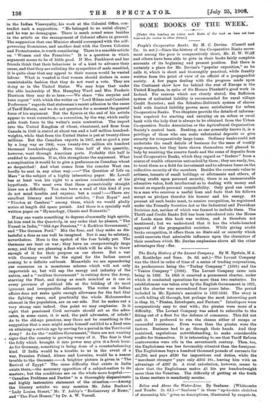SOME BOOKS OF THE WEEK.
[Under this heading we notice such Books of the week as hays not been reserved for review in other forms.] People's Co-operative Banks. By H. C. Devine. (Cassell and Co. is. net.)—Since the history of the Co-operative Banks move- ment among the poor is comparatively short, Mr. H. W. Wolff and others have been able to give in their books fairly complete accounts of its beginning and present position. But there is certainly a place for Mr. Devine's "popular exposition," as he calls it, which is short and thoroughly practical, while frankly written from the point of view of an official of a propagandist society. A few pages dealing with the progress made upon the Continent show how far behind the rest of Europe is the United Kingdom, in spite of Sir Horace Plunkett's good work in Ireland. For reasons which are clearly stated, the Raffeison system of unlimited liability is recommended for rural village Credit Societies ; and the Schultze-Delitzsch system of shares held with limited liability proves more satisfactory for urban Co-operative Banks. Two chapters provide the details of informa- tion required for starting and carrying on an urban or rural bank with the help that is always to be obtained from the Urban Co-operative Banks Association or the Agricultural Organisation Society's central bank. Banking, as one generally knows it, is a privilege of those who can make substantial deposits or give security for comparatively large loans. Ordinary banks could not undertake the small details of business for the mass of weekly wage-earners, but they have shown themselves well pleased to help by receiving the reserve funds and the sums of deposits from local Co-operative Banks, which they regard as "feeders" from a source of wealth otherwise untouched by them; they are ready, too, to treat them as a field for investment and to advance loans on the collective security of the members. Besides the economic value to artisans, tenants of small holdings or allotments and others, of giving credit upon personal security, there is an immeasurable educative value, both intellectual as to dealing with money and moral as regards personal responsibility. Only good can result to a man who receives a useful loan and feels that his fellows accept as pledges therefor his honour and his energy. At present all such banks must, to receive recognition, be registered under the Friendly Societies Act or the Industrial and Provident Societies Act, neither of which was framed to include them. The Thrift and Credit Banks Bill has been introduced into the House of Lords since this book was written, and is therefore not mentioned ; but we understand that it has the whole-hearted approval of the propagandist societies. While giving credit banks recognition, it offers them no State-aid or security which could enervate that admirable influence upon the characters of their members which Mr. Devine emphasises above all the other advantages they c ffer.






































 Previous page
Previous page